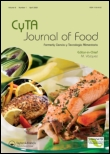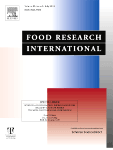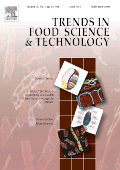
Journal of Food Science and Technology-Ukraine
Scope & Guideline
Unlocking Knowledge in Food Safety and Quality
Introduction
Aims and Scopes
- Food Processing Technologies:
Research on various methods and technologies used in food processing, including fermentation, drying, and extraction techniques. - Functional Foods and Nutraceuticals:
Investigation into the development and characterization of functional foods, including the use of natural ingredients that provide health benefits beyond basic nutrition. - Food Safety and Quality Control:
Studies addressing food safety concerns, quality control measures, and the impact of different processing methods on food safety. - Biotechnology in Food Production:
Exploration of biotechnological applications in food production, including the use of microorganisms and enzymes to enhance food quality and safety. - Sustainable Food Production:
Research focusing on sustainability in food production, including waste management and the use of alternative raw materials. - Nutritional Studies and Food Composition:
Examination of the nutritional value of food products, including the analysis of bioactive compounds and their health effects.
Trending and Emerging
- Microbiome Research in Food Science:
An increasing number of studies are exploring the role of microbiomes in food products and human health, reflecting a growing interest in the connections between diet and gut health. - Functional Ingredients from Waste Materials:
Research on utilizing by-products and waste materials from food production processes to create functional ingredients is gaining momentum, highlighting sustainability and innovative uses of food waste. - Health Benefits of Fermented Foods:
The exploration of probiotic and fermented food products is on the rise, emphasizing their health benefits and potential applications in nutrition and wellness. - Advanced Food Processing Techniques:
Emerging technologies such as cavitation, microwave treatment, and other innovative processing methods are being increasingly studied for their effectiveness in improving food quality. - Nutritional Enhancement of Foods:
Research aimed at enhancing the nutritional profile of food products, particularly through biofortification and the incorporation of functional ingredients, is becoming more prevalent.
Declining or Waning
- Traditional Food Preservation Techniques:
There has been a noticeable decline in research focusing on conventional food preservation methods, as the journal shifts towards more innovative and modern techniques. - Animal-Based Product Research:
Although still relevant, studies specifically on traditional animal-based food products have decreased, indicating a potential shift towards plant-based alternatives and functional foods. - Basic Food Chemistry:
The foundational studies in food chemistry are becoming less prevalent, with a growing preference for applied research that connects chemical properties to practical food applications.
Similar Journals

Journal of Future Foods
Transforming agricultural science into culinary progress.Welcome to the Journal of Future Foods, a prominent peer-reviewed publication dedicated to advancing knowledge and innovation within the realms of Agricultural and Biological Sciences, Food Science, and Nutrition and Dietetics. Published by KEAI PUBLISHING LTD in China, this journal has rapidly achieved a distinguished reputation, reflected in its impressive Q1 category ranking for both Agricultural and Biological Sciences and Food Science, along with a strong standing in Nutrition and Dietetics. The journal, which spans the period from 2021 to 2025, is committed to fostering interdisciplinary research that addresses the challenges and opportunities presented by the future of food. With a focus on open access, the Journal of Future Foods aims to disseminate crucial findings and foster collaborative dialogue among researchers, professionals, and students alike. By submitting your work, you not only contribute to cutting-edge advancements in the field but also join a vibrant community engaged in redefining the future of food systems.

CyTA-Journal of Food
Exploring new horizons in food safety and quality.CyTA-Journal of Food is a prestigious academic journal published by TAYLOR & FRANCIS LTD, dedicated to advancing the field of food science and technology through the dissemination of innovative research and practical knowledge. With an ISSN of 1947-6337 and an E-ISSN of 1947-6345, this journal stands out with its strong impact factor and is currently placed in the Q2 quartile across multiple categories, including Chemical Engineering, Chemistry, and Food Science, making it a vital resource for researchers and professionals alike. The journal has been an integral part of the academic community since its inception in 2009, and continues to publish cutting-edge articles through to 2024. Its alignment with Scopus ranks further signifies its influence, notably achieving 67th percentile in Industrial and Manufacturing Engineering. As an Open Access journal, it ensures widespread accessibility to its valuable content, promoting collaboration and knowledge sharing among scientists, engineers, and students dedicated to enhancing food safety, quality, and sustainability.

Journal of Food and Nutrition Research
Transforming Food Science into Nutritional KnowledgeJournal of Food and Nutrition Research, published by the VUP FOOD RESEARCH INST in Bratislava, Slovakia, serves as a vital platform for disseminating cutting-edge research in the fields of food science and nutrition. With an ISSN of 1336-8672 and an E-ISSN of 1338-4260, this journal emphasizes the importance of interdisciplinary approaches to address contemporary challenges related to food quality, dietary practices, and nutritional health. Notably recognized in the 2023 Scopus rankings, the journal is classified in Q3 quartiles for both Food Science and Nutrition & Dietetics, providing a forum for researchers aiming to enhance knowledge and practices within these domains. Those engaged in academia and industry will find the journal invaluable for its comprehensive scope, which covers novel food technologies, nutrition interventions, and the implications of dietary behaviors. Though not open access, the journal is dedicated to enriching the academic conversation and contributing to advancements in public health and nutrition policies.

FOOD TECHNOLOGY AND BIOTECHNOLOGY
Exploring New Frontiers in Food Technology and BiotechnologyFOOD TECHNOLOGY AND BIOTECHNOLOGY is a distinguished peer-reviewed journal published by the Faculty of Food Technology and Biotechnology, University of Zagreb, Croatia. Since its inception in 1993, this Open Access journal has become a crucial platform for disseminating innovative research in the fields of food science, biotechnology, and chemical engineering. With a commendable impact factor and consistent Q2 and Q3 rankings across multiple categories—including Biotechnology, Food Science, and Industrial Engineering—this journal not only fosters academic discussions but also addresses real-world challenges in food production, safety, and sustainability. As it converges its thematic scope from 1996 to 2024, FOOD TECHNOLOGY AND BIOTECHNOLOGY remains committed to advancing knowledge through high-quality research and interdisciplinary collaboration, making it an essential resource for researchers, professionals, and students seeking to stay at the forefront of food innovation and biotechnology.

Applied Food Research
Transforming Research into Real-World SolutionsApplied Food Research, published by Elsevier, is an esteemed journal that plays a critical role in advancing the field of Food Science. With an ISSN of 2772-5022, the journal has established itself as a premier outlet for high-quality research, achieving a commendable Q1 ranking in the 2023 Food Science category and a 63rd percentile in Scopus rankings for Agricultural and Biological Sciences. Covering a diverse range of topics from food safety to innovative processing techniques, Applied Food Research seeks to publish pioneering studies that enhance our understanding of food systems and contribute to broader discussions on sustainability and nutrition. As it converges on its fourth year of publication, researchers, professionals, and students alike are encouraged to engage with its content through various open access options, ensuring widespread dissemination of knowledge in a field that is vital to global health and well-being. Operating out of Amsterdam, Netherlands, this journal is poised to be an indispensable resource for anyone dedicated to making significant contributions in the domain of food science.

FOOD RESEARCH INTERNATIONAL
Elevating Standards in Food Science ResearchFOOD RESEARCH INTERNATIONAL is a premier academic journal published by ELSEVIER, specializing in the field of Food Science. With an impressive impact factor and ranked Q1 in the 2023 category quartiles, it stands at the forefront of research, positioned 17th out of 389 in the Scopus ranking for Agricultural and Biological Sciences, attaining a commendable 95th percentile. The journal publishes high-quality, peer-reviewed articles that cover a broad spectrum of topics, including food safety, quality control, nutrition, and biotechnology, making it an invaluable resource for academics, industry professionals, and students alike. As FOOD RESEARCH INTERNATIONAL seeks to enhance understanding and advance technologies related to food, it encourages innovative perspectives and interdisciplinary research. The journal, active from 1992 and continuing through 2024, is an essential platform for disseminating vital findings and fostering collaboration within the global food science community.

Ukrainian Food Journal
Unveiling breakthroughs in food technology and safety.Ukrainian Food Journal is an esteemed open-access journal dedicated to advancing the field of food science and biochemistry. Established in 2012 and published by the National University of Food Technologies in Ukraine, the journal serves as a vital platform for researchers and professionals to disseminate their findings on food technology, safety, and nutritional biochemistry. With an ISSN of 2304-974X and E-ISSN 2313-5891, it offers a wealth of knowledge to its readers, promoting innovation and collaboration within the industry. While currently categorized within the Q4 quartile of biochemistry and the Q3 quartile of food science, the journal is progressively gaining recognition, reflecting a commitment to quality research in a competitive field. The journal is indexed in Scopus, ranking #271 in Food Science and #376 in Biochemistry, underscoring its relevance and contribution to agricultural and biological sciences. The Ukrainian Food Journal not only enriches the academic community with its open-access model but also aims to foster dialogue among researchers, professionals, and students dedicated to improving food systems and nutrition. It operates from its headquarters in Kyiv, offering a hub for creativity and advancement in food-related research.

Food Frontiers
Elevating Food Science with Cutting-Edge ResearchFood Frontiers, an esteemed publication in the Food Science domain, is proudly published by WILEY. Launched as an Open Access journal in 2020, it aims to facilitate the dissemination of high-quality research that influences contemporary food science and technology. The journal, with an E-ISSN of 2643-8429, has rapidly ascended to a Category Quartile ranking of Q1 in the Food Science category as of 2023, and boasts an impressive Scopus rank of #31 out of 389 in Agricultural and Biological Sciences, placing it in the 92nd percentile. The journal's mission is to explore innovative approaches to food production, safety, and sustainability, making it an essential resource for researchers, industry professionals, and students eager to stay at the forefront of food science advancements. With a commitment to open accessibility, Food Frontiers fosters collaboration and knowledge sharing across the globe, addressing the critical challenges and trends in feeding the world sustainably.

Food and Bioprocess Technology
Transforming Food Systems Through Bioprocess InnovationFood and Bioprocess Technology, an esteemed journal published by Springer, serves as a premier platform for disseminating cutting-edge research in the realms of food science, industrial manufacturing engineering, and process chemistry and technology. Established in 2008, the journal has quickly ascended to the prestigious Q1 quartile in multiple categories, highlighting its impact and relevance within the scientific community. With an impressive Scopus ranking that places it in the top tiers of its fields—such as rank #17 in Safety, Risk, Reliability, and Quality, and rank #38 in Food Science—this journal is pivotal for researchers and professionals aiming to publish innovative findings that advance food processing and bioprocess technology. Beyond its rigorous peer-review process, the journal facilitates access to high-quality, impactful research, reinforcing its significant role in shaping the future of biotechnological applications in food systems. Aimed at both scholars and practitioners, Food and Bioprocess Technology is an essential resource for those engaged in exploring sustainable practices and enhancing food quality and safety. Furthermore, by addressing essential topics in the field, it fosters collaboration and knowledge exchange among researchers dedicated to advancing the bioprocessing landscape.

TRENDS IN FOOD SCIENCE & TECHNOLOGY
Unveiling the latest advancements in food science.Trends in Food Science & Technology, published by Elsevier Science London, stands as a premier journal in the fields of food science and biotechnology. With an impressive Q1 ranking in both the food science and biotechnology categories, it is recognized for its rigorous peer-reviewed articles that advance knowledge and innovation in the sector. The journal’s Scopus rankings validate its significance, placing it in the top percentile among its peers, with a remarkable rank of #2 out of 389 in Agricultural and Biological Sciences - Food Science, and #4 out of 311 in Biochemistry, Genetics, and Molecular Biology - Biotechnology. Since its inception in 1990, the journal has become a vital resource for researchers, professionals, and students alike, offering insights into contemporary challenges and trends impacting food technology. Although it operates under a subscription model, the quality of research published within its pages makes it an essential read for anyone involved in advancing the science of food.